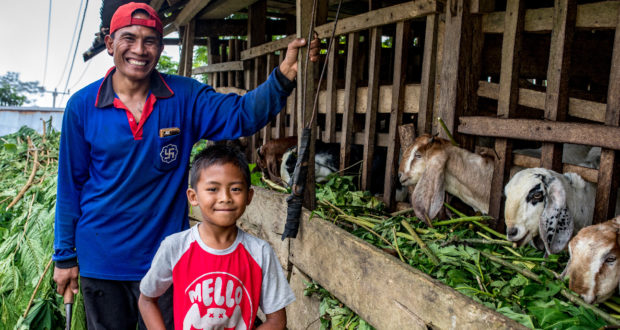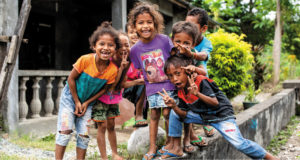This article is brought to you by UnitingWorld.
UnitingWorld’s Cath Taylor shines a light on the life-changing results your donations have on communities in Indonesia and how a humble goat can lead to schooling, medicine, food and economic development.
Okay look, goats are good for a lot of things, but changing lightbulbs isn’t one of them. Sorry to disappoint. On the other hand, they can change a life, and that’s arguably much better!
This is Wayan, father of three, with his son Gede and a couple of the family goats. Twice a day, Wayan and Gede head up the hill with a load of greens to tempt the palates of these hungry beasts, who are giving back to the family in more ways than one.
The goats will eventually be sold to provide income for medicine, school fees, cooking oil and household items. In the meantime, they’re providing (literally) heaps of manure that can be sold off to the local coffee farmer, who modestly tells us his coffee is the best in the business. With the fragrance of freshly roasted beans in our nostrils, we’re tempted to believe him.
High in the mountains north of Denpasar, Indonesia, Wayan and his wife Puta are part of a community left behind by the tourist dollar. They’re landless small farmers, cut out of the tourist industry and literally struggling to survive. Wayan’s community have worked the land for centuries with an ever-shrinking return, new diseases like HIV/Aids to navigate, painful knowledge of everything from which they’re excluded (Internet is widespread) and few services available to help.
We partner with the Bali Christian Church, which represents less than 1 per cent of the population. In a Muslim country, the island of Bali’s majority Hindu population are already on the edge. Doubly isolated, Bali’s Christians are still determined to be God’s people wherever and whenever they’re needed.
Teams from UnitingWorld partner MBM travel to more than twenty remote communities to listen and learn, all with the aim of helping people flourish. Toilets are built. Children brush their teeth for the first time, learn how to wash their hands and avoid disease. Doctors visit to provide basic health care, teach about protection from communicable disease and care for mothers and newborns. Small businesses are seeded, with women cooking cassava to package and sell locally. And of course, the goats. Breeding projects are providing much needed income for these families, literally changing lives.
This is the model of development we’re employing successfully with families and communities throughout Asia, Africa and the Pacific. Smart, capable people are teaming up with UnitingWorld partners, learning from their expertise and developing skills to take control of their own futures. It’s not really the goats who change the lives. It’s the people. We’re better together.
Cath Taylor
Right now, we’re teaming up not just with our partners overseas, but adding your gift to Australian government funding to make up to six times the impact toward ending poverty. We’ve committed to raising $1 for every $5 we receive from Australian Aid, meaning we can increase the impact of our work. Please help us end poverty and give at unitingworld.org.au/together or give us a call on 02 8267 4267.
 JourneyOnline
JourneyOnline







